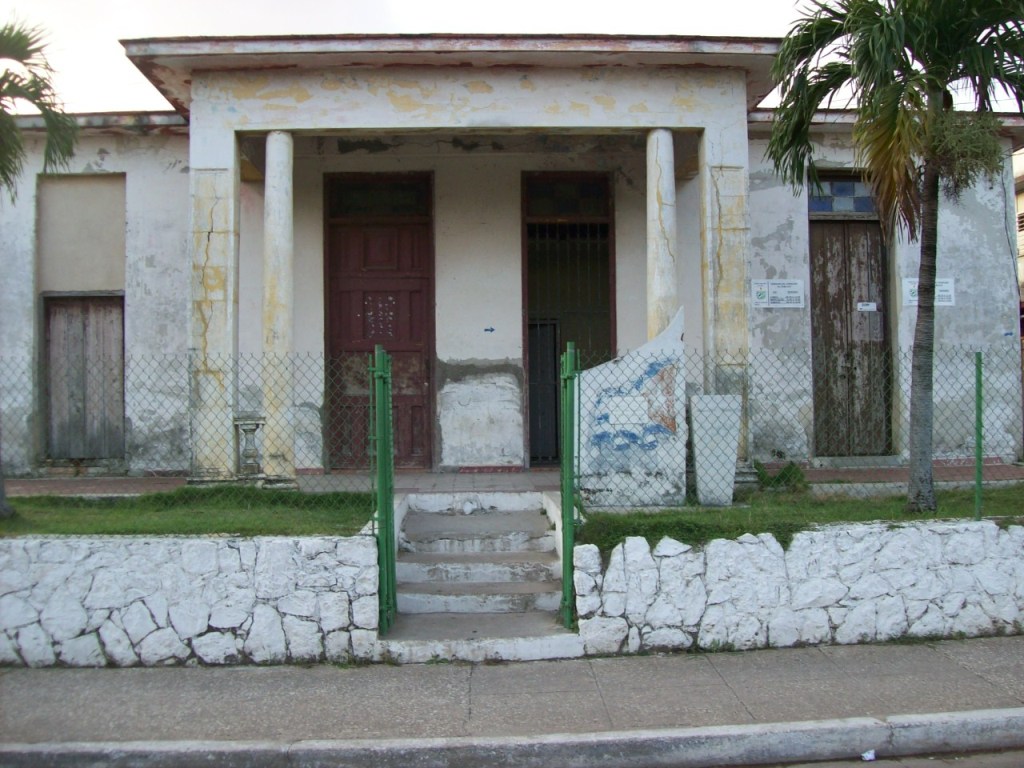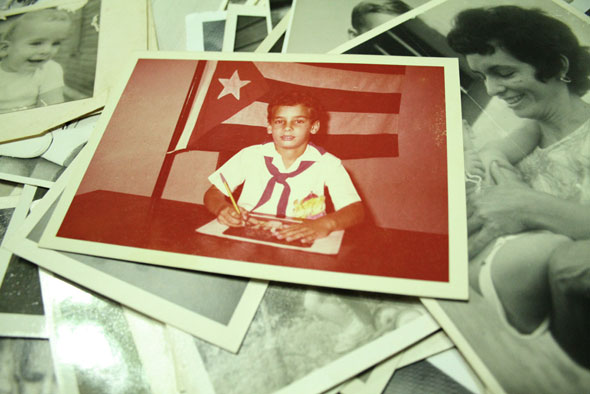I confess that I didn’t remember the full text known as “Words to the Intellectuals,” delivered by Fidel Castro on June 30, 1961, at the National Library to a group of intellectuals. I think that, like many people, the only thing I remembered from the text was his famous declaration of principles, “Within the revolution everything, against the Revolution, nothing” which, without doubt, sums up the essence of the document.
In the debate that is taking place at this time among a group of people – not only by intellectuals – by e-mail (which limits, of course, a larger participation), they started asking questions about a number of problems, past and present, of national culture, upon the surprising reappearance of three officials – simple executors of a cultural policy drawn and guided by the highest leadership of the country, who, in the decade of the ’70s, were at the forefront of major cultural institutions: former Lt. Luis Pavón (President of the National Council for Culture, 1971-1976), former commander Serguera Papito (director of Cuban Television, 1966-1973) and Armando Quesada, who, among other things, was responsible for destroying the Cuban theater during those years. These functionaries were former military officers who had been part of Raul Castro’s team. Given the current situation in the country, in which the Minister of the Armed Forces has assumed the leadership of the government, many thought that the “resurrection” of Pavón, Serguera and Quesada was a sign that there would be a return to the past.
During the “reign” of these gentlemen, a veritable witch-hunt was unleashed in the country against gay writers and artists; books were censored (the “Padilla case,” 1971), what was called “ideological deviations” (having long hair, wearing blue jeans, listening to the Beatles and other groups and singers not well-regarded by the government, having “wrong sexual preferences,” professing any religion, etc.) were severely punished; the poet and novelist Jose Lezama Lima, who died in 1976, was condemned to an intellectual silence, etc.
Although the persecution worsened in these five years, it had started in the early ’60s (censorship of the film, P.M.; UMAP; charges against Padilla and Arrufat in 1968; the destruction of the collection of poems by Delphin Prats, Lenguaje de mudos (1968); the banning on radio and television of broadcasts about artists who had gone abroad, they began purging the country’s universities, etc.) and this would continue, with different nuances, sometimes more, sometimes less, until today. continue reading
Examples abound: the censorship in the artistic movement of the late ’80s, the relentless criticism of the film Alicia en el pueblo de Maravillas (1991); the imprisonment of María Elena Cruz Varela (1993); criticism of the film Guantanamera (1997, at a meeting in the Palacio de las Convenciones, after Eliseo Alberto, co-screenwriter of the film and author of the book, informed against me, he won the Alfaguara Novel Prize), the impossibility of mentioning writers and artists living abroad who don’t have a position that is “comfortable” for the system, the “disactivation” (no longer belonging to UNEAC) of the writer Antonio José Ponte upon finding out that he was part of the editorial board of the magazine Encuentro (2002), the jailing of poet Raúl Rivero and others for the crime of expressing their opinions openly, although they were accused of being “enemy agents” in hasty trials (2003); the censorship of documentaries and critical short films, like the recent case of Monte Rouge (2005), etc.
Pavón, Serguera and Quesada disappeared from the cultural “landscape” in 1976 when the Ministry of Culture was founded and started a new stage that, no doubt, wished to correct the mistakes and tried to foster an environment of trust and respect, which was achieved in many ways. To reappear in the final months of 2006, thirty years later, in three different programs on Cuban television. Those who suffered firsthand the injustices committed during those years reacted angrily, with good reason, and decided to show it through the limited space of email.
The controversy has transcended national borders, many Cubans living abroad have expressed their views. Others – inside and outside – want the debate to include other key issues (a justified demand since, as the economists of the nineteenth century including Karl Marx, said, “the economic base defines the superstructure,” from where it naturally follows that we must seek answers about the culture in the economy). Unfortunately, some use abusive language, bring out the “dirty laundry” and tarnish a discussion that could and should be deep, serious and inclusive of all opinions.
The tone of the debate has ranged from complex and measured analysis to actual attacks, furious and unpleasant. I think for the good of all and the country, it would be advisable that we all try to listen with tolerance and respect to each other’s opinions. In a country where for years the only prevailing view has been the official standard – with very limited space for debate – it’s not easy to develop a balanced dialogue, without offense or impassioned responses.
In the “Declaration of the Secretariat of UNEAC,” insufficient and misguided for many – no one understands why it was drafted like that, if they had plenty of time to write something more elaborate and consistent with everything that had been proposed – it states: “Cultural policy reflects Martí; it’s the anti-dogmatic, creative and participatory policy of Fidel and Raúl, founded on ‘Words to the intellectuals,’ and irreversible.” Alfredo Guevara also endorses this statement. And this is the point I want to analyze.
In the first place, Fidel defined the cultural policy in his words. Raúl Castro had nothing to do with it, among other things, because it’s not his specialty. The fact that his name is added to the declaration of UNEAC responds to the current situation, not to his actual participation in its development. The meeting with the intellectuals came two months after the Bay of Pigs invasion, in an extremely difficult time for the Revolution, with strong and real threats from the United States and a huge political tension that would peak in October the next year. The main topic of discussion, according to Fidel himself, was freedom of expression.
No one questions the form, just the content, and it sets out clearly a disturbing indictment: he who has doubts is not a true revolutionary. I think, with all due respect, this approach is not correct, not true, and it’s this criterion that led to a series of injustices against artists. It generated an official thinking that was rigid, narrow and reminiscent of the excesses and mistakes of the Soviet Union beginning with the era of Stalin. Why could a revolution that had the support and love of the majority of the population not allow dissent? It would have been healthier for the system to allow the free exchange of ideas, because, undoubtedly, the Revolution, with all its social and economic achievements, would be victorious in this battle. But it chose the path of rigidity, and that path led to an abyss of frustration and injustice.
What calls my attention is the beginning of his speech, where Fidel propounds that:
“That is, the benefits, both material and cultural, were designed to be enjoyed by protagonists and contemporaries of the Revolution. The writers and artists would be living their moment of fulfillment, they were granted the right to be free, a right won with weapons in a just struggle. But those who mistrusted, who had different opinions, were automatically ‘out of the game’. In the cultural supplement Lunes de Revolucion, founded in 1959, the writers who belonged to the Grupo Origenes were harshly criticized, by Catholics, the bourgeois and those who were apathetic. Didn’t these writers feel marginalized from the revolutionary process? Weren’t they made to feel guilty for doubting and having philosophical ideas that were different from those of the successful revolution? Wasn’t the moment of ‘now and for the men of this time’ meant for them”?
But in the end, Fidel affirms the opposite and asks for the ultimate sacrifice:
“Gentlemen, would it not be better to think about the future? Are we to think that our flowers will wilt when we are planting flowers everywhere? When we are forging these creative spirits of the future? And who would not change the present, who would not change even their own present for that future? Who would not change his, who would not sacrifice his for the future? And those who have artistic sensibility, don’t they have the disposition of the fighter who dies in battle, knowing that he dies, that he ceases to exist physically to fertilize with his blood the road of triumph for those like him, his people? Think of the soldier who dies fighting, sacrifices everything he has, sacrifices his life, sacrifices his family, sacrifices his wife, sacrifices his children. For what? For us to do these things. And those who have human sensitivity, artistic sensibility, don’t you think it’s worth making the necessary sacrifices? But the revolution is not asking sacrifices of creative geniuses; on the contrary, the Revolution says: put this creative spirit in service of this work, without fearing the work will be cut short. But if one day you think your work may be cut short, say: it’s well worth it to have my personal work cut short in order to do work like what we have before us.”
One of the topics discussed was the censorship of the documentary made by Sabá Cabrera, P.M. It was considered harmful for the people because it presented scenes of night life in Cuba, at the end of 1960, that were not found, according to the standards of the senior ICAIC functionaries, at the height of the moment being lived by the country. Fidel talks about the documentary, although he confesses that he has not seen it.
I think in the context of the times, as I said, in the midst of difficult situations in which the Revolution needed to consolidate itself, an inflexible and cautious policy was justified, and that the approach of “against the Revolution, nothing” had its reason for existing. On countless occasions the country’s development has demanded changes, adjustments, modifications; it’s a logical process of life itself. Fidel himself has not hesitated to make these changes: he denounced the “errors and negative tendencies” (1984); there were major shifts in economic policy (“now we are going to build socialism,” he affirmed in 1986, denouncing a series of situations that threatened the country’s economic development), and more recently, in his speech at the Aula Magna of the University of Havana (November 17, 2005), he made these reflections.
I don’t think we should accept that the Martían cultural policy, anti-dogmatic, creative and participatory, of Fidel and Raúl, founded on “Words to the intellectuals,” is irreversible, among other things because that statement itself is dogmatic (as defined by the DRAE, “dogmatic”: inflexible, holding opinions as firm truths, without doubts or contradictions.”) Everything can be reversible (only death is not); everything can be improved, adapted or made more perfect; all have the right to participate, pro and con. In Cuba – perhaps as in no other country – education and culture have developed; art schools have been created, a successful literacy campaign was carried out, libraries have multiplied, education has been brought to the most remote corners of the island, a solid, superior intellectual and artistic movement has been created. So I think it’s time to raise a genuine national dialogue, where everything is questioned and analyzed, without fear or rules, and where a genuine exercise of freedom of expression is permitted.
Josefina de Diego
Havana, January 25, 2007
Another text from Josefina de Diego
“Let’s follow orders” or “Who belled the cat”?
The “Five-year gray period,” framed between the years 1971-1976, was only a stage – not gray but black – within the entire cultural context of the island. The problems that are attributed to this period had begun from 1959, and had “their best definition” in June 1961, with the famous “Words to the intellectuals,” handed down by Fidel in the National Library.
In late 1960, the documentary PM, directed by Sabá Cabrera Infante and Orlando Jiménez Leal, was censored. Lunes de Revolución lambasted the Grupo Orígenes (1959-1961); in 1961, private schools were nationalized, and priests and nuns were expelled; that year also created the ORI (Integrated Revolutionary Organizations), which merged all political groups that fought against the Batista dictatorship, which eliminated any possible source of opposition, however slight it might be. Anibal Escalante, a prominent member of the PSP, was named director; in 1962 Anibal Escalante and his top aides were expelled from the direction of the ORI, accused of sectarianism; in 1963, the ORI replaced the United Party of Socialist Revolution (PURS), the antecedent of the future Communist Party (the only one) of Cuba (1965). The sadly-remembered UMAP, a shameful chapter in our history, occurred between 1964 and 1969: the censorship of the books Fuera del juego, by Heberto Padilla, Los Siete Contra Tebas, by Antón Arrufat and Lenguaje de mudos, by Delfín Prats, to name only well-known examples, followed in 1968. On March 13, 1968, in a speech to commemorate the attack on the Presidential Palace, Fidel confirmed the arrest and imprisonment of the microfraccionarios, led by Anibal Escalante, and announced the beginning of the Revolutionary Offensive, which ended, among other things, the small amount of private property that still remained. It was also in the late sixties that the purges began in the universities, the accusations of “ideological deviations,” etc.
In the following decades the problems continued, though not with such intensity and intolerance. I won’t do the recount, because many have already taken this on in the current debate, but what I want to emphasize is that the control on freedom of expression, the media, free association, etc., has maintained itself until our time, and not only in the cultural sector but in all sectors of society. ICAIC, an agency with a reputation for being liberal, is still deciding which scripts are shot and which aren’t, which movies are shown and which aren’t, just like they did with PM in 1960. The imprisonment of Raúl Rivero and independent journalists, in 2003, and other cases of censorship and restrictions that occurred “yesterday,” are proof of that.
It would also be unfair not to recognize all the undeniable progress made in this half-century of Revolution: no government set out to do so much for “the poor of this earth.” It brought education and public health to the farthest corners of the country (although the quality has declined considerably in the last fifteen years. I think disproportionate international aid is being provided to many countries; it has left the island without the doctors and teachers it needs, which has seriously affected the quality and quantity of these services – for the record, I think it’s a humanitarian and generous effort, worthy of respect and admiration, that all governments should exercise); important plans were developed for cultural, social and economic development; the Literacy Campaign was a success; schools and art institutes, libraries, museums, cultural centers, the National Ballet, ICAIC, the Casa de las Americas, etc., were founded.These seeds bore the precious fruits that we collect today.
Now, returning to the title of this text – which I don’t want to prolong any more – I would say that I have drawn attention to the statements of two officials who stood out during the “Five-year gray period”: Serguera and Félix Sautié (second to Pavón). Both have said (Serguera in an interview and Sautié in a letter) that they received and followed orders, like soldiers. According to them, they were not responsible for what they did, only the executors of the policy outlined by the “highest leadership of the country,” that is, the policy defined in 1961. We all know that this was and still is so. I think centralized power over the years has been the cause of many of the difficulties that we now suffer. I don’t doubt the good intentions, but the fact that there is no real discussion and debate in the bodies responsible for defining the government’s policy has not been beneficial for the integral development of the nation.
There is something that I’ve always held as an unquestionable principle, but I think it can be the cause of many of the ills that plague us (the double standard, apathy, laziness and skepticism of the young, among others): the existence of a single party (I don’t want my words to be misinterpreted nor to be accused of having an “annexationist agenda” nor of “aiding the enemy.” I simply express my opinion.) I remember one person who told me: “It’s true that Martí created a single party, but who founds a party and another one that opposes it at the same time?” The existence of a single opinion (for example, all members of the National Assembly are members of the same party) prevents the necessary flow of different ideas that are important for the “oxygenation” of the country and its organic development. The claims that this gives “arms to the enemy” and that “it’s not the time” have returned like a boomerang, and it’s the people who are left without the weapons they need to build, think and organize their country. In other words, silence has prevented the actual display of ideas and concerns of the people, the true exercise of free speech, debate, confrontation of opposing views, effective exchange and the enrichment of different opinions.
If the officials of the period under discussion were following orders, who gave them? Why did they if, as Serguera said, he did not even agree with many of them? Why was this type of behavior generated, to accept everything, to not question anything? Wouldn’t it be good and healthy to begin to change this mentality? Why not have a debate – not only on culture but also on the economy, education, public health – where these issues can be analyzed in depth, and we can begin to change what needs to be changed?
The international situation has evolved, the left has been reborn with renewed vigor in many parts of the world, and Cuba is again accompanied by numerous Latin American countries. I think, honestly, if you rethink a lot of things considered as immutable in our country, it would be an important step toward rescuing, protecting and keeping all the achievements – which are a lot – in these years.
Josefina de Diego
Havana, February 9, 2007
Another text from Josefina de Diego
Case closed
The “Five-year gray period” was a term used by Ambrosio Fornet to refer to the “grayness” of the literature written between the years 1971-1976, as a result of a policy of doctrine, suspicion and intolerance against the cultural sector, and the calls that were made by the highest political and cultural leadership of the country to develop an art that is truly “revolutionary,” something impossible to achieve starting from such narrow limits. Previously there had been a moment of glory – according to Fornet, a “Five-year gold period” – with Los años duros of Jesús Díaz, Condenados de Condado by Norberto Fuentes, Los pasos en la hierba by Eduardo Heras León (all published at the end of 1960), etc. And also – although I believe that Ambrosio is not referring to these books – with Celestino antes del Alba, by Reinaldo Arenas (1967), Fuera del juego (1968), by Heberto Padilla, Lenguaje de mudos (1968), by Delfin Prats and others. But when talking about the “Five-year gray period,” you’re also talking about the persecution initiated by Pavón and his followers against homosexuals, “intellectuals” and extravagant people, the “marginalization” of playwrights and artists in general, “ideological deviations,” etc.., a period which, as we all know, lasted much longer than five years.
Many people say “now it’s over,” that “it was a ‘bad cold” (according to the statements of Reinaldo González published by the newspaper El Clarín, February 13, 2007), that the “Five-year gray period” and the debate that occurred in January and February this year are now “a closed case,” to use terminology that the famous series CSI: Crime Scene has made fashionable.
I think that, indeed, many things have changed for the better, that the persecution of homosexuals has decreased and, at present, although there are many prejudices, now you can’t expel anyone for that reason from work and the universities. Even television itself shows programs that touch on this subject with great breadth and depth, as in the recent telenovela, La cara oculta de la Luna. It’s also true that there is a real opening and that subjects that would have been impossible to discuss are now being thought about and questioned (the proof is this debate). But I do believe that there are still serious limits on the true exercise of free speech, free association, free movement (not to mention other problems, very serious, in the area of production). Government officials still retain the right to decide what is ideologically correct or not, they still are able to grant or withhold permission to leave or enter the country where you were born. It’s still nothing more than a brake on freedom of movement and, indirectly, on freedom of expression (many people are denied the right to travel because of their political views). Cases of censorship of books, authors (who live in Cuba or abroad), documentaries and movies, etc., still exist and have occurred in this 21st century, not just in the “Five-year gray period.”
But they don’t accept this reality, nor do they want to recognize the errors and injustices that were committed. And if they don’t recognize, if they don’t point out the real causes, we cannot consider this a “closed case,” because, continuing the detective terminology, “the evidence” shows that there still remains much to be rectified. As Dr. Arnoldo Kraus says, in his book Who will speak for you? An account of the Holocaust in Poland.
I could continue enumerating examples, but right now there has already been a lot written about what happened in those last years.
I think many people would like the debate to be extended, so it doesn’t stay in the narrow context of the decade of the ’70s. It didn’t happen, although it’s good to recognize that up to now the views expressed through the limited space of email have been respected, and that, by all accounts, those who were able to participate in the conference on 30 January, expressed themselves freely. “From the wolf, a hair,” we could say, without much enthusiasm and little conviction.
Josefina de Diego
Havana, February 20, 2007
Translated by Regina Anavy









 Three days had passed since I was presented before the maximum chiefs of the “Aguica” penitentiary. I found myself in a cruel and degrading world, and what stabbed at my conscience the hardest was the fact that I was separated from my wife and from my only son, who at the time was a mere four years old (and who was sleeping by my side when I was arrested by the political police).
Three days had passed since I was presented before the maximum chiefs of the “Aguica” penitentiary. I found myself in a cruel and degrading world, and what stabbed at my conscience the hardest was the fact that I was separated from my wife and from my only son, who at the time was a mere four years old (and who was sleeping by my side when I was arrested by the political police).